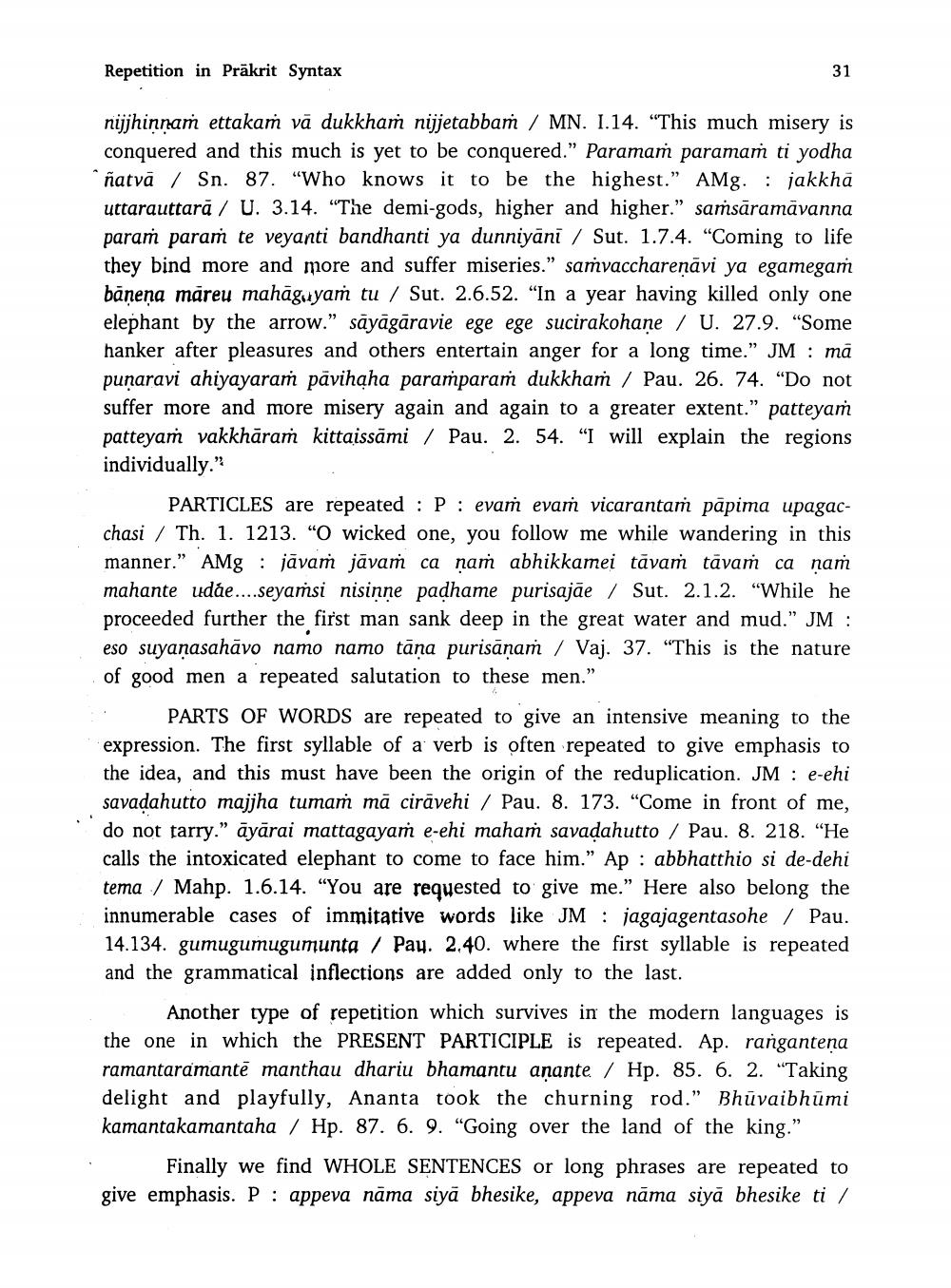________________
Repetition in Prākrit Syntax
31
nijjhinnam ettakam vā dukkham nijjetabbam / MN. 1.14. “This much misery is conquered and this much is yet to be conquered." Paramam paramam ti yodha ñatvā / Sn. 87. “Who knows it to be the highest.” AMg. : jakkhā uttarauttară / U. 3.14. "The demi-gods, higher and higher.” samsāramāvanna param param te veyanti bandhanti ya dunniyāni / Sut. 1.7.4. "Coming to life they bind more and more and suffer miseries." samvaccharenāvi ya egamegam banena mareu mahāguyam tu / Sut. 2.6.52. "In a year having killed only one elephant by the arrow.” sāyāgāravie ege ege sucirakohane / U. 27.9. "Some hanker after pleasures and others entertain anger for a long time." JM : mā punaravi ahiyayaraṁ pāvihaha paramparam dukkham / Pau. 26. 74. "Do not suffer more and more misery again and again to a greater extent." patteyam patteyam vakkhāram kittaissāmi / Pau. 2. 54. "I will explain the regions individually."
PARTICLES are repeated : P: evam evam vicarantam pāpima upagacchasi / Th. 1. 1213. "O wicked one, you follow me while wandering in this manner." AMG : jāvam jāvam ca nam abhikkameitāvam tavam ca nam mahante udáe....seyamsi nisinne padhame purisajāe / Sut. 2.1.2. “While he proceeded further the first man sank deep in the great water and mud.” JM : eso suyanasahāvo namo namo tāna purisanam/ Vaj. 37. “This is the nature of good men a repeated salutation to these men.”
PARTS OF WORDS are repeated to give an intensive meaning to the expression. The first syllable of a verb is often repeated to give emphasis to the idea, and this must have been the origin of the reduplication. JM : e-ehi savadahutto majjha tumam mā cirāvehi / Pau. 8. 173. "Come in front of me, do not tarry." āyārai mattagayaṁ e-ehi mahaṁ savadahutto / Pau. 8. 218. "He calls the intoxicated elephant to come to face him." Ap : abbhatthio si de-dehi tema / Mahp. 1.6.14. “You are requested to give me.” Here also belong the innumerable cases of immitative words like M : jagajagentasche / Pau. 14.134. gumugumugumunta / Pay. 2.40. where the first syllable is repeated and the grammatical inflections are added only to the last.
Another type of repetition which survives in the modern languages is the one in which the PRESENT PARTICIPLE is repeated. Ap. rangantena ramantaramantē manthau dhariu bhamantu anante / Hp. 85. 6. 2. "Taking delight and playfully, Ananta took the churning rod." Bhūvaibhūmi kamantakamantaha / Hp. 87. 6. 9. "Going over the land of the king."
Finally we find WHOLE SENTENCES or long phrases are repeated to give emphasis. P : appeva nāma siyā bhesike, appeva nāma siya bhesike ti /




